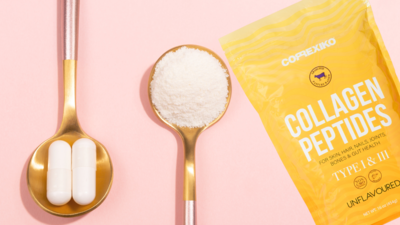Collagen supplements: Why they may not be improving your skin |


Collagen Supplements: Do they really work?
In recent years, collagen supplements have become a popular trend in the beauty and health industry. These products, ranging from collagen gummies, powders, and pills to creams, claim to promote youthful skin, better joint health, and improved digestion. However, many experts argue that these supplements are not as effective as advertised.
Function of collagen in body
Collagen, a protein that acts as the body’s scaffolding, is abundant in our younger years, giving skin its plumpness and joints their flexibility. As we age, collagen production naturally decreases, resulting in wrinkles, joint pain, and digestive issues. This decline has led many to seek collagen supplements as a solution.
Why do we lose collagen?
Lifestyle factors like excessive sun exposure, smoking, acidic diets, and high sugar intake can accelerate collagen loss. Interestingly, sugar plays a significant role by increasing the glycation process, which damages collagen proteins, making them dry and brittle.
Why collagen supplements might not work
Collagen supplements fall into two categories: topically applied creams and edible forms like pills and powders. Topical creams claim to deliver collagen through the skin, but collagen molecules are too big to be absorbed transdermally. Edible forms face a similar issue, as the body cannot effectively absorb collagen through the digestive system, leading these supplements to be excreted without much benefit. Additionally, many collagen supplements contain additives like maltodextrin and artificial flavors, which are best avoided.
Correct way to increase collagen in skin
Maintaining youthful looks and overall health may require less reliance on supplements and more focus on healthy lifestyle choices. To naturally boost collagen production, experts recommend a diet rich in protein, vitamin C, and minerals such as zinc and copper. Foods like citrus fruits, peppers, tomatoes, broccoli, and greens, along with tofu, nuts, whole grains, and beans, can support the body’s collagen production. Strategies include eating more plant-based foods, reducing sugar intake, staying hydrated, exercising regularly, and protecting skin from excessive sun exposure.

The takeaway
Our advice is clear: Avoid wasting your money on supplements with questionable benefits. Instead, invest in a nutritious diet and a healthy lifestyle for long-term well-being. For those seeking effective and natural solutions, prioritize whole, nutrient-dense foods and other established healthy habits over costly collagen supplements.
What is collagen? Why it is important and 5 vegetarian sources
See more: Weight Loss Tips to Lose Inches of Stubborn Belly Fat in a Healthy Way
link



.jpg)



